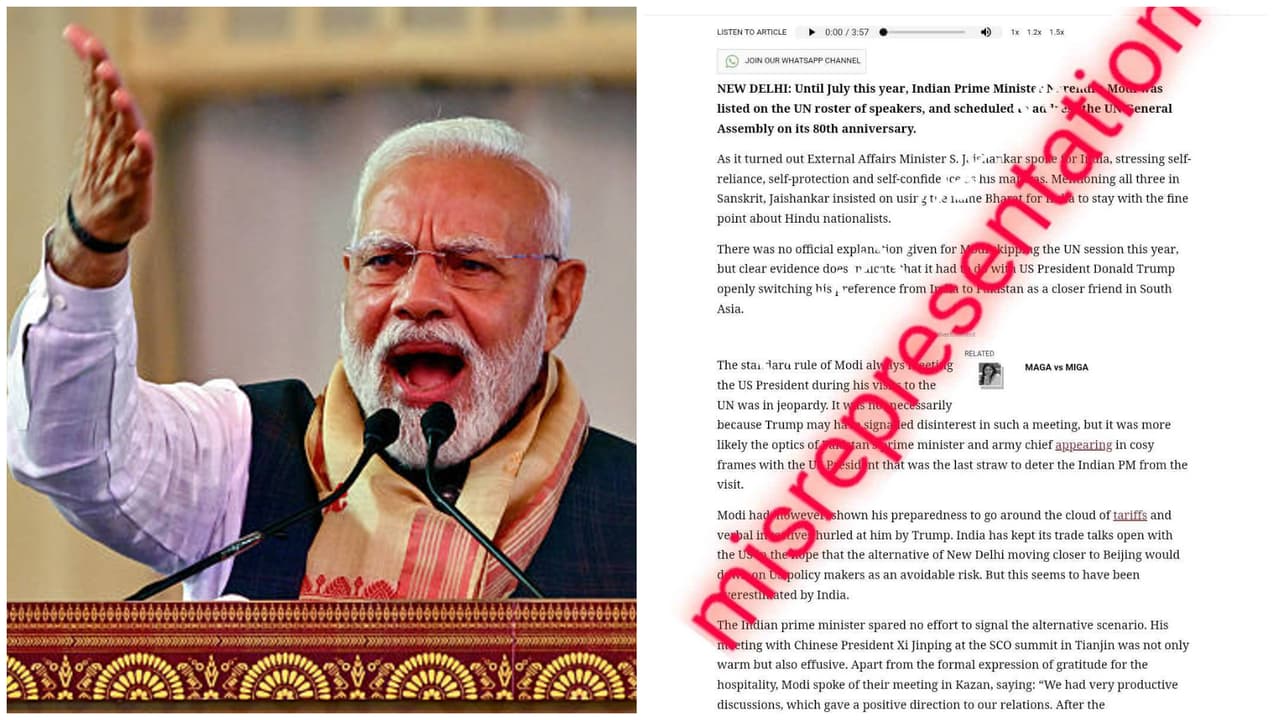Recent reports in Pakistan’s media suggesting that Prime Minister Narendra Modi skipped the United Nations General Assembly (UNGA) 2025 due to diplomatic failures are entirely misleading.
Contrary to recent reports in Pakistan’s media Dawn, Prime Minister Narendra Modi’s absence from the United Nations General Assembly (UNGA) 2025 is not the result of diplomatic miscalculations, but a standard practice rooted in India’s diplomatic tradition. It is important to note that India was fully represented at the UNGA high-level General Debate themed “Better Together: 80 Years and More for Peace, Development and Human Rights.” External Affairs Minister Dr S. Jaishankar addressed the 80th UNGA in New York on September 28, amid the shadow of Trump tariffs on India and the H1-B visa blow and continuing India’s consistent and strategic engagement at the global forum.
This arrangement mirrors past instances where the PM’s presence was not necessary, but India maintained its diplomatic engagement through senior ministers.
Pakistan Media’s misleading claims
“There was no official explanation given for Modi skipping the UN session this year, but clear evidence does indicate that it had to do with US President Donald Trump openly switching his preference from India to Pakistan as a closer friend in South Asia. The standard rule of Modi always meeting the US President during his visits to the UN was in jeopardy. It was not necessarily because Trump may have signalled disinterest in such a meeting, but it was more likely the optics of Pakistan’s prime minister and army chief appearing in cosy frames with the US President that was the last straw to deter the Indian PM from the visit,” Pakistan Media Dawn reported.
However, these reports that PM Modi skipped the UN session due to diplomatic failures are entirely misleading.
Every year, the UN issues a provisional list of speakers for the General Assembly. By protocol, the head of government or state is usually included in this initial list, even if they do not ultimately address the session. The final decision on who speaks are confirmed closer to the event. The UNGA list of speakers for the General Debate is provisional and there is always possibility of changes in schedules and speakers ahead of the commencement of the high-level week.
According to a previous provisional list of speakers issued in July, PM Modi was scheduled to address the General Debate on September 26. However, it was later decided that S Jaishankar will represent India at the forum and accordingly he delivered his address. PM Modi had travelled to the US in February this year for a bilateral meeting with Trump at the White House in Washington.
Scroll to load tweet…
Similarly, for the 2024 session, PM Modi was initially listed in the provisional schedule but was engaged in other international commitments, including the Quad meetings in the United States. In his stead, S Jaishankar had delivered India’s address at the UNGA.
Scroll to load tweet…
Pakistan thrilled with Trump’s embrace
Pakistan’s media, especially television and social media, appeared ebullient and over the moon after the nearly 90-minute interaction between US President Donald Trump and Pakistan’s Army Chief, Field Marshal Asim Munir, who was accompanied to the White House by Prime Minister Shehbaz Sharif. The jubilation is understandable. Islamabad had waited more than four years to get a call from Washington. Many argue that the meeting signifies Pakistan’s return from a period of relative irrelevance to one in which world powers and significant states once again recognise its importance.
The Pakistani lens is certainly glazed by memories of the early Biden years, when the US president never called then–Prime Minister Imran Khan, and when the Quadrilateral Security Dialogue (QUAD), with India at its centre, had displaced Pakistan in Washington’s military-strategic calculus.
